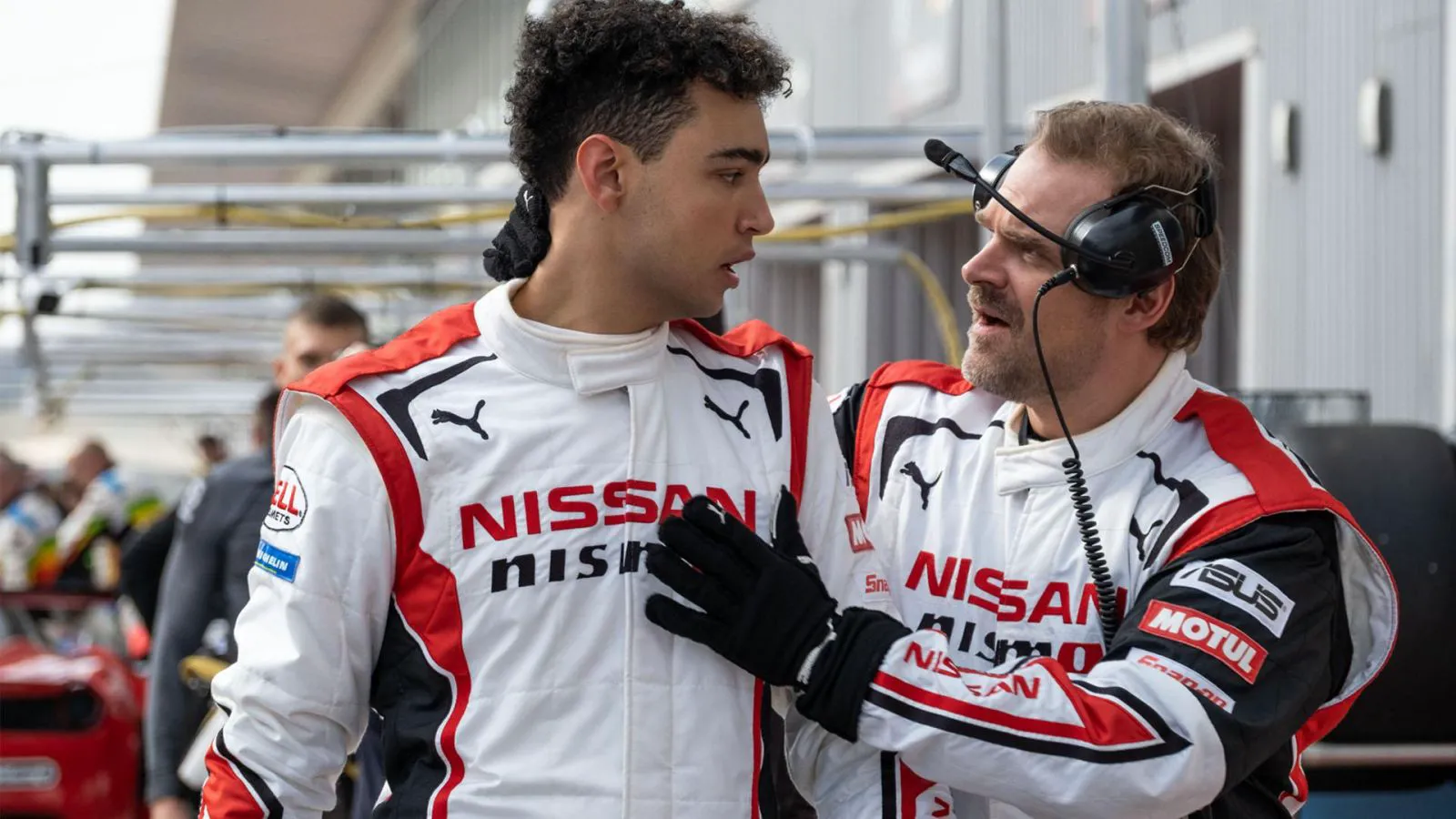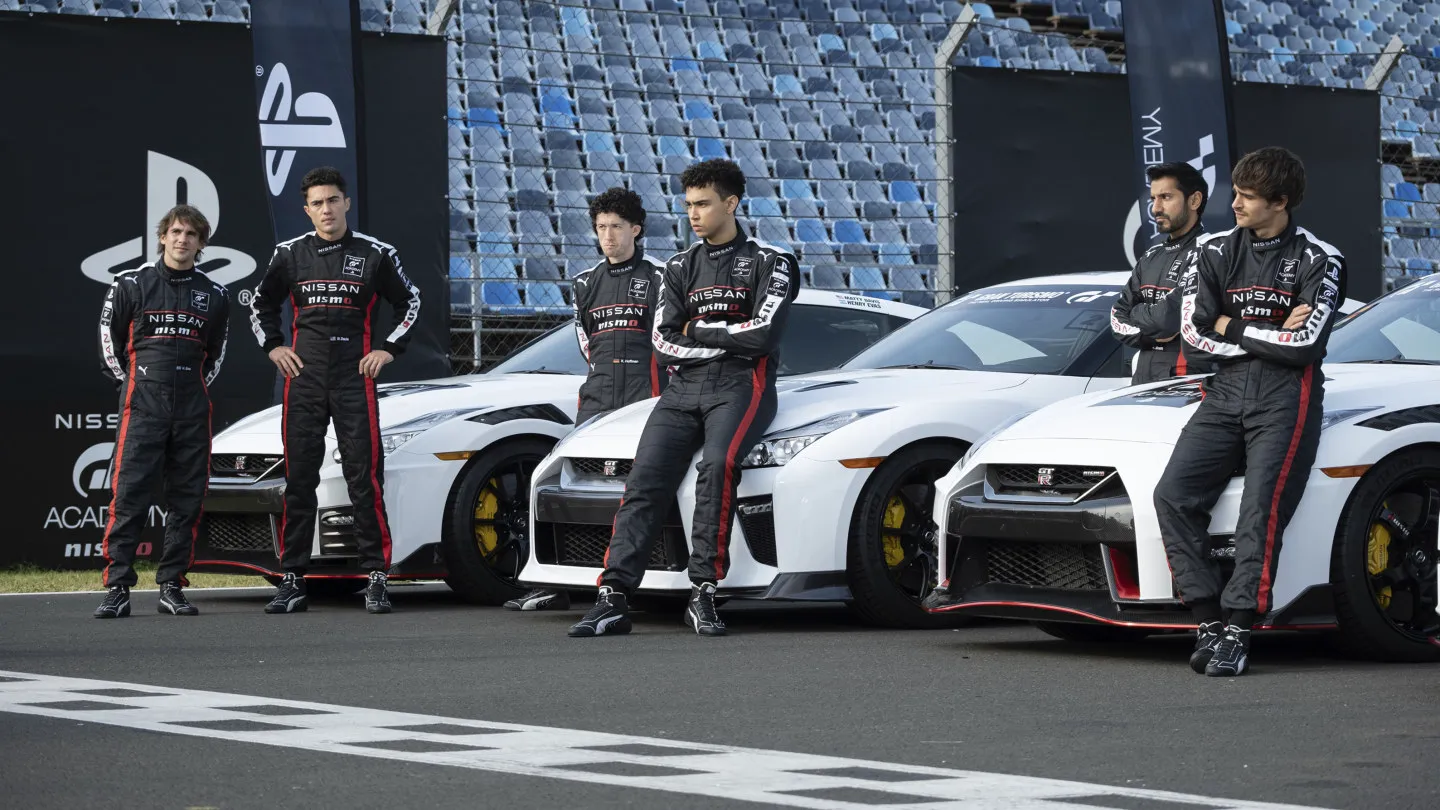As a teenager, Jann (Archie Madekwe) was deeply passionate about playing Gran Turismo. His father (Djimon Hounsou) was a former professional soccer player, his younger brother (Daniel Puig) was successfully finishing high school, and Jann had worked for a month at a lingerie store to save up for a new steering wheel for his PlayStation. In his hometown of Cardiff, he had already beaten everyone multiple times and spent his days competing solely against himself. He might have remained glued to his console until old age, but Nissan, specifically marketing executive Danny Moore (Orlando Bloom), with his idea of transferring virtual racers into real sports cars, saved Jann from a life as an overgrown gamer.

David Harbour as Jack in a still from “Gran Turismo”
The most surprising thing about the film “Gran Turismo” is that it’s based on the true story of Jann Mardenborough. Nissan did indeed experiment with Gran Turismo racers in reality in 2011, and Mardenborough was one of the few who successfully transitioned from a gamer’s chair to a real car. Apart from this fact, the film doesn’t even feel like a video game, which might have been a good thing; instead, it feels like a two-hour commercial for the video game.

Orlando Bloom as Danny in a still from “Gran Turismo”
The film can be roughly divided into two parts: the gaming part and the racing part. In the first, Jann spends most of his time in front of the console, clashing with his parents, who, for some reason, aren’t thrilled with their son’s obvious obsession with the Japanese video game. He develops ingenious strategies for overtaking virtual opponents and tries to prove to those around him that this is real life. In short, he behaves erratically, but one day, the world bends to his will. At the same time, Danny Moore, the marketing executive at Nissan, persuades the bosses at Gran Turismo to hold a competition among gamers and put a few of the best on a real racetrack. The idea gets the green light, Mardenborough achieves the best result among British players, and becomes one of those admitted to training in real sports cars.
Here, their “coach,” engineer Jack Salter, played by David Harbour, starts to steal the show. This giant sometimes seems like the only one who could save the film. Madekwe-Jann clearly lacks acting skills, and Bloom, and even two-time Oscar nominee Hounsou, seem to have nothing to play, and their characters are given minimal screen time. Salter is sarcastic, Salter is stern, Salter turns “armchair racers” into real athletes, and even develops a liking for the recruits. And in the best moments, when only the race remains on screen, and the script forgets to add lines like “This is reality, not a game, remember that!” and “If you doubt, you won’t be confident!”, you might even mistake the film for “Baby Driver.” But, alas, neither the director (the author of “District 9,” by the way) nor screenwriter Alex Tse are anywhere near Edgar Wright, and therefore the expensive commercial remains just that: a commercial.
Outstanding actors in supporting roles and the once-promising director Neill Blomkamp are powerless against the fact that they are adapting a racing simulator. The two-hour film exists as if without a core; it’s probably the perfect film to showcase all the capabilities of the 4D cinema format, where the viewer, among other things, is tossed around in their seat. The benevolent tone, without unnecessary emotional swings, can, of course, win you over at some point: when else will there be a movie where the main character moves so smoothly and steadily towards inevitable success, overcoming all obstacles in a maximum of 5-10 minutes? But such a lack of conflict only reinforces the feeling of watching a child’s let’s play, not a movie.

Archie Madekwe as Jann in a still from “Gran Turismo”
“Gran Turismo” tries to exploit all available templates, but seems to break down at the very beginning, when, under the guise of a supposed conflict between fathers and sons, the idea is pushed that e-sports are no different from regular sports. And in general, Gran Turismo is not just a replacement, but is real sports car racing. If you can handle it on PlayStation, you can handle it on the track! It seems like nonsense, but it is this worldview that is offered to be believed “by default,” and for the next two hours, the main character will impose it on the other characters, and the viewer is supposed to support Jann in the battle between Jann and common sense. And Orlando Bloom, with the appearance of the Joker and the mannerisms of Alex the lion from “Madagascar,” is no longer so absurd—an ambitious marketer hungry for profit with sudden bouts of awakening conscience. The sketch of a love line with the most implausible girl (Maeve Courtier-Lilley) in the world is almost not embarrassing. The same can be said about the main rival on the track, Nicholas (Josha Stradowski)—a caricaturedly evil rich kid who just wants to send someone into a ditch. His driving experience is complete nonsense compared to the thousands of hours Jann has played in Gran Turismo.
It would seem that “Gran Turismo” has everything it needs, but its inherent flaw, the absurd premise of the equality of a sports car and a PlayStation, coupled with an indecently emasculated script that grabs at everything and drops everything, does not allow the film to develop into something more than a promotional video for a racing simulator.